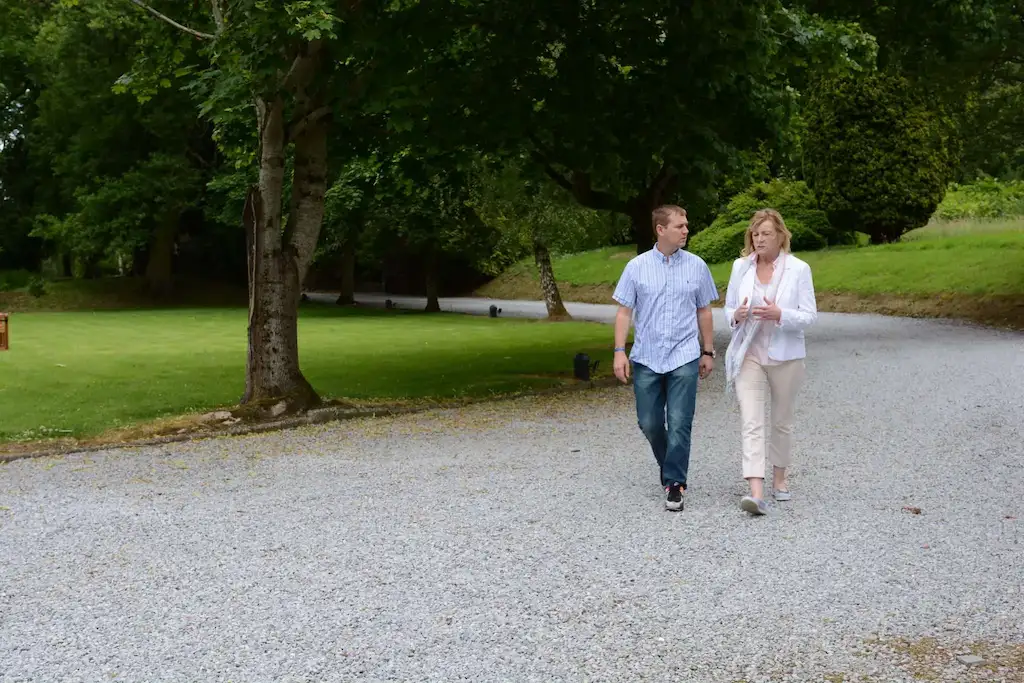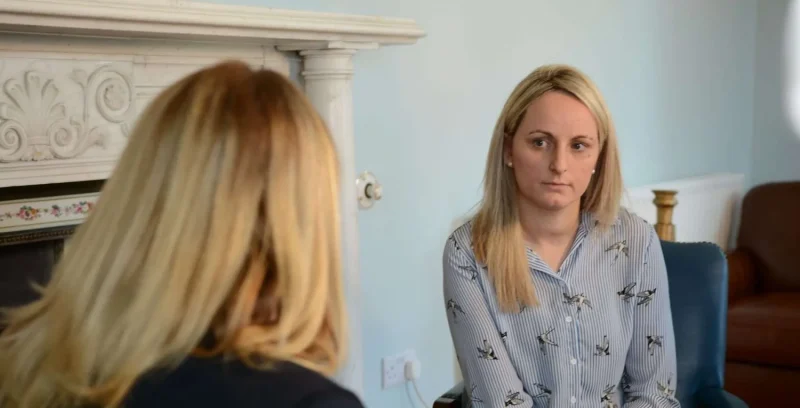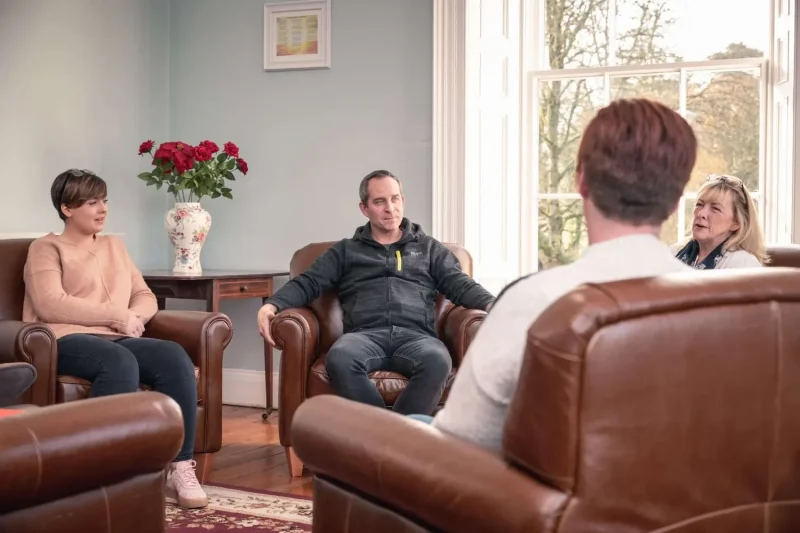
Get Help For A Loved One
Watching your loved one battling addiction is extremely painful and can leave you feeling helpless, frustrated and fearful. However, being in active addiction is also overwhelming and exhausting, and to increase the chances of getting someone into treatment, you might want to consider offering a helping hand.
Choosing the right rehab is a crucial first step in the recovery journey. The right rehab offers a supportive environment for healing and growth. Your effort in finding a place that meets their needs is a significant way to show your support. This journey may have its challenges, but by helping them find the right path, you’re offering a guiding hand in a difficult time.
Smarmore Castle is a prime example of a treatment centre that provides holistic and personalised care. We understand that each case of addiction is unique, and our approach is tailored to meet individual needs. When selecting a treatment facility, also consider the environment and atmosphere of the centre, as a supportive and healing environment is crucial for recovery.
Our serene and therapeutic setting, combined with our expert staff and proven treatment methodologies, make us a preferred choice for many seeking help for their loved ones.

Download our Brochure
How Can I Help a Loved One Suffering Addiction
Your support and understanding can make a significant difference in their recovery journey. Begin by approaching your loved one with compassion and empathy. Understand that addiction is a complex and often misunderstood condition, and your loved one may be experiencing feelings of shame, guilt, or denial.
Encourage open discussions about their addiction, and offer your support in seeking professional help. Be patient and understand that recovery is a process that may involve setbacks. Stay informed about the nature of addiction and the recovery process to better support your loved one. Offer to help with practical tasks like researching treatment options, accompanying them to appointments, or simply being there to listen. Remember, your support can be a crucial factor in encouraging your loved one to take the first step towards recovery.
Educate Yourself About Addiction
Gaining a comprehensive understanding of addiction is vital in helping your loved one. Educate yourself about the physical and psychological aspects of addiction, the cycle of addiction, and the most effective treatment methods. This knowledge will enable you to offer informed support and understand the challenges your loved one is facing.
There are numerous resources available, including books, online materials, and workshops, which can provide valuable insights into addiction. Understanding the science behind addiction, such as how it alters brain chemistry and behaviour, can help you empathise with your loved one’s struggle. Additionally, familiarising yourself with the signs of addiction and the common challenges faced during recovery can prepare you for the journey ahead. Knowledge is a powerful tool that can help you provide the right support and avoid common pitfalls, such as enabling behaviour.

Keep the Lines of Communication Open
Effective communication is crucial in supporting a loved one through addiction recovery. Create a safe and open environment where your loved one feels comfortable sharing their thoughts and feelings. Listen actively and without judgment, and encourage them to express themselves honestly. Avoid criticism or lecturing, as this can lead to defensiveness and hinder open communication.
Regular, empathetic conversations can strengthen your relationship and build trust, making it easier for your loved one to seek your support. Be patient and understand that your loved one may not always be ready to talk. Let them know you are there for them whenever they need to share. Additionally, express your feelings and concerns in a supportive manner, focusing on how your addiction affects you emotionally.

Set Clear Boundaries
Setting clear and healthy boundaries is essential when dealing with a loved one’s addiction. Boundaries help define what is acceptable and what is not in your relationship. Communicate your boundaries clearly and calmly, and be consistent in enforcing them. This might include not tolerating substance use in your home, not providing financial support for their addiction, or refusing to cover up their addictive behaviours.
Setting boundaries is not about punishing your loved one but about protecting your well-being and encouraging them to take responsibility for their actions. It is also important to set boundaries for yourself, such as not sacrificing your own needs and well-being for your loved one’s addiction. Remember, boundaries are an act of self-care and respect, both for yourself and your loved one.
Don’t Place Blame
Avoiding blame is crucial in supporting a loved one with addiction. Addiction is a complex disease, and placing blame can add to feelings of guilt and shame, which can hinder recovery. Focus on supporting and encouraging your loved one, rather than blaming them for their addiction or its consequences.
Approach conversations with empathy and understanding, emphasising your concern for their well-being rather than expressing anger or disappointment. Recognise that addiction is a result of various factors, including genetic, environmental, and psychological influences. Encourage your loved one to take responsibility for their recovery without making them feel blamed for their condition.
Protecting Yourself
Supporting a loved one with addiction can be emotionally draining and stressful. It’s important to take care of your own mental and emotional health. Seek support for yourself, whether through counselling, support groups, or confiding in friends and family. Make time for self-care activities and maintain your hobbies and interests.
Setting boundaries is also a form of self-protection. Ensure that you are not enabling your loved one’s addiction or sacrificing your own needs and well-being. It’s okay to seek professional help for yourself to navigate the challenges of having a loved one with addiction. Remember, taking care of yourself is not selfish; it’s necessary to maintain your ability to support your loved one effectively.
Learning to Spot Emotional Manipulation
Being able to recognise emotional manipulation is important in supporting someone with addiction. Manipulation can take many forms, such as guilt-tripping, making excuses, or shifting blame to avoid responsibility for their addiction. Stay aware of these tactics and respond with calm assertiveness.
Maintain your boundaries and avoid getting drawn into arguments or negotiations about addictive behaviours. Educate yourself on healthy communication strategies to counter manipulation and maintain a supportive yet firm stance. Remember, emotional manipulation is often a defence mechanism, and addressing it with understanding and firmness can help your loved one realise the need for change.

Try Family Therapy
Family therapy can be an effective way to address the impact of addiction on the family dynamic. It provides a space for all family members to express their feelings, discuss how the addiction has affected them, and work together towards healing. A therapist can guide the family in improving communication, resolving conflicts, and understanding each other’s perspectives.
Family therapy can help the family learn how to support the loved one with addiction effectively, while also addressing any family issues that may be contributing to the addiction. It also provides tools and strategies for dealing with the challenges of addiction and recovery as a family. Engaging in family therapy can be a powerful step towards healing and strengthening the family unit.
Avoid Enabling Their Behaviour
Enabling behaviour can inadvertently perpetuate your loved one’s addiction. Enabling includes actions such as making excuses for their behaviour, covering up their addiction, or providing financial support that allows them to continue their substance use. Recognise and avoid enabling behaviours, and instead focus on actions that support recovery.
Encourage treatment and healthy behaviours, set and enforce boundaries, and encourage your loved one to take responsibility for their actions. By not enabling, you help your loved one face the consequences of their addiction, which can be a powerful motivator for change. It’s important to differentiate between supporting and enabling and to focus on providing support that encourages recovery.
Stage and Intervention
If your loved one is resistant to seeking help, consider staging an intervention. An intervention is a carefully planned process where family and friends confront the individual about their addiction and the impact it has had. The goal is to motivate them to seek help and enter treatment.
Smarmore Castle can arrange interventions with trained interventionists who can guide the process, ensuring it is conducted respectfully and effectively. The interventionist can help plan the intervention, guide what to say, and mediate the conversation. It’s important to approach the intervention with love and concern, rather than blame or anger. A well-conducted intervention can be a turning point, helping your loved one realise the need for treatment and take the first step towards recovery.
The Role of Personal Will in Addiction
At Smarmore Castle, we understand the deep concern and desire to help a loved one struggling with an addiction. It’s natural to want to intervene and direct them towards recovery. However, it’s crucial to recognise the importance of voluntary participation in the recovery process.
The journey to recovery is deeply personal. Encouragement and support are vital, but the decision to seek help must come from the individual. This respect for their autonomy is not just about honouring their choices; it’s also about empowering them to take ownership of their journey.
Evidence shows that when people make a personal decision to seek help, they are more likely to engage actively in the treatment process. This engagement is a key predictor of successful recovery. It reinforces the importance of taking responsibility for their healing and growth, which is why rehabs cannot admit patients who are there against their will.

Smarmore Has Given Thousands of People a Second Chance at Life…
What Happens When My Loved One Goes to Rehab?
You will undoubtedly feel a huge sense of relief knowing that your friend or family member has made it into rehab, but you may still have a lot of unanswered questions. What happens while they’re in rehab? Will I get to speak to them? How will I know if they are OK? These are all valid questions and, understandably, you will feel nervous about being away from them as they go through treatment.
However, you can rest assured that they are in safe hands at Smarmore. During the first few days of treatment, patients will undergo detox should they require it. Here they will receive around-the-clock care from our clinical team in our specialist detox facility. Once they have completed detox, they will move on to
Our team at Smarmore are here to support not just our patients but also their families and loved ones. We offer resources and guidance to help you navigate this challenging yet hopeful journey. When your loved one is ready, we are here to provide the care and treatment they need to embark on the path to recovery.
Schedule Your Assessment
If you or a loved one are struggling, our team is here to help – contact us in confidence today.